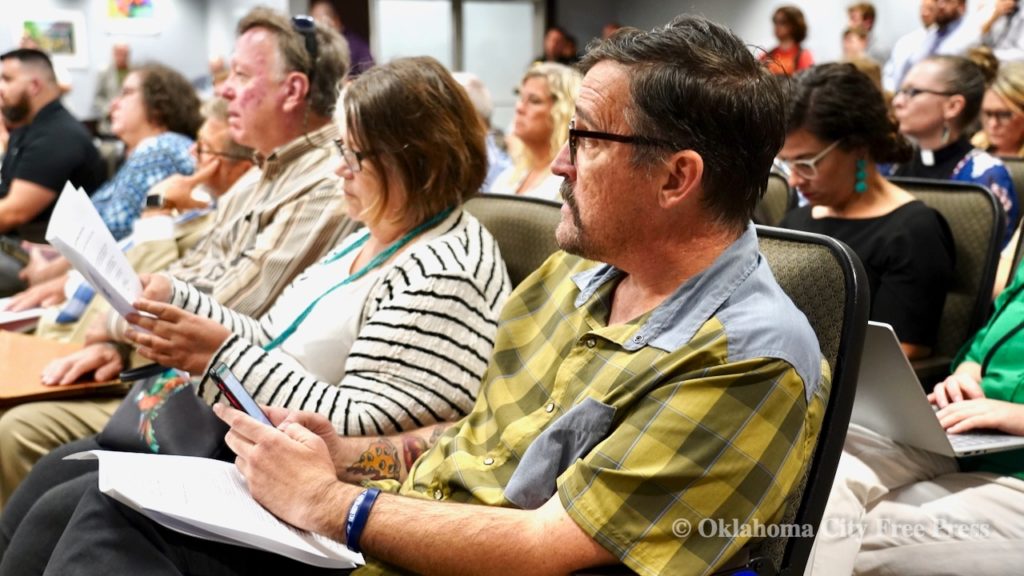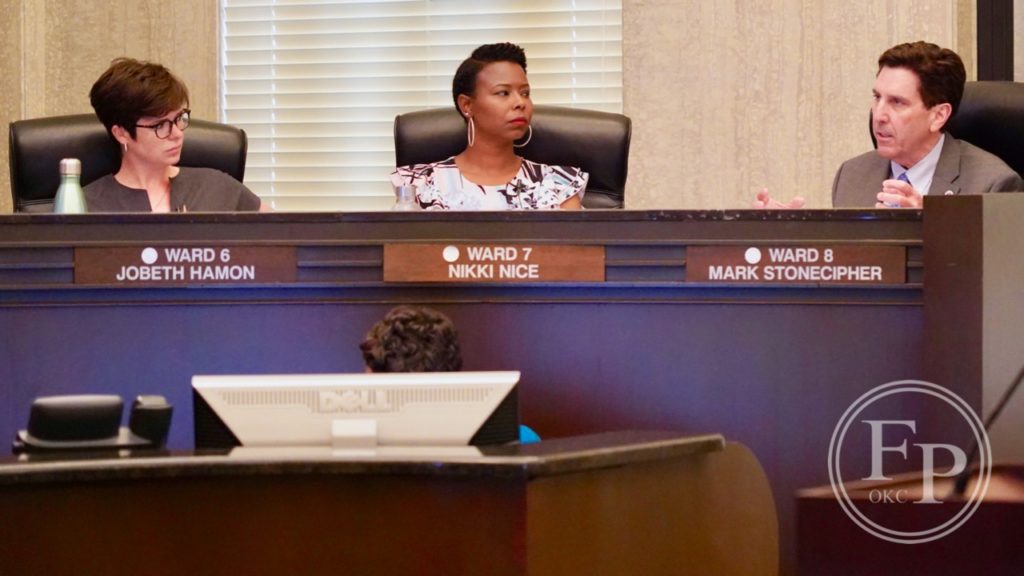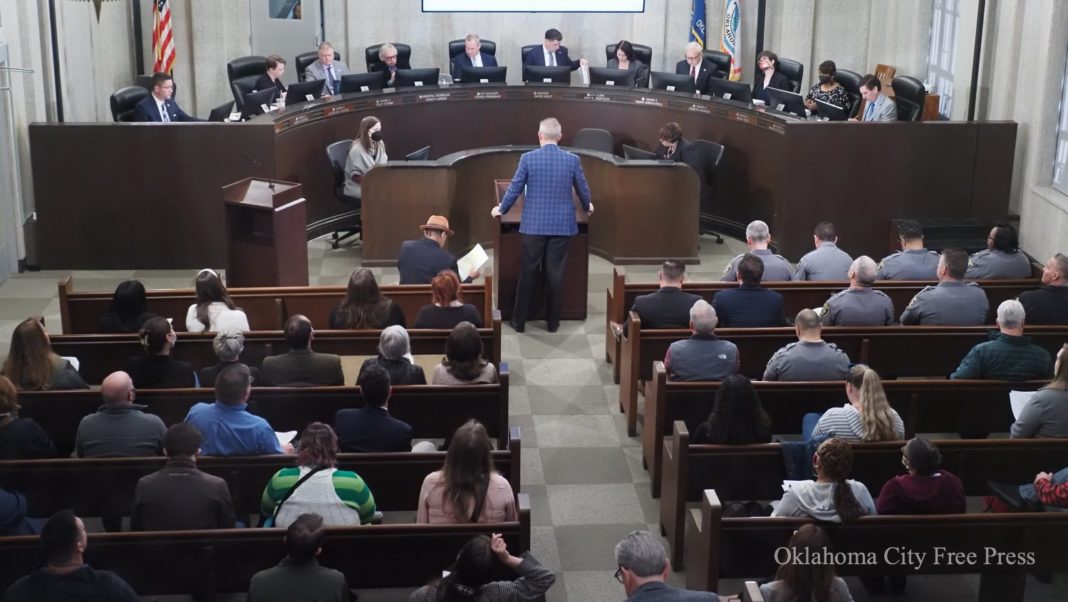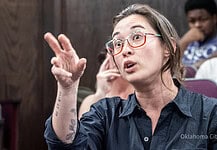Last Updated on April 26, 2022, 3:52 PM | Published: April 26, 2022
OKLAHOMA CITY (Free Press) — On Tuesday, the City Council of Oklahoma City held their regular meeting, and began with a proclamation declaring this National Deaf History Month while welcoming a delegation from the Oklahoma City Deaf Club.
The Council approved a $1 million allocation of American Rescue Plan Act (ARPA) for aid for arts-related nonprofit organizations. Council also heard about an exciting new opportunity for addressing Youth Homelessness in Oklahoma City.
They also narrowly passed an ordinance making it more difficult for some Oklahoma City residents to get a license to operate a massage business.
And finally, a controversial development project by the Oklahoma City Housing Authority finally received approval, while also receiving stern criticism from one member.
ARPA
Assistant City Manager Aubrey McDermid came before the Council to explain an allocation of American Rescue Plan Act funds.
The City is ready to allocate $1 million in assistance for Arts and Culture related nonprofits.
The funds will be available to nonprofits under categories 501c3 and 501c19 that are arts related and qualify for aid after the ravages of COVID-19, the deadly pandemic that is still killing people across the world.
The fund will be administered through the City’s Planning Department in partnership with Allied Arts of Oklahoma.

Marty Peercy reports Local government
Youth Homelessness
Jarod Shadid, Homeless Services Coordinator, gave a brief presentation to the Council concerning an operating agreement with the Oklahoma Department of Mental Health and Substance Abuse Services (ODMHSAS) for a program called Youth Homelessness Demonstration Project.
This highly competitive federal funding program will open doors to rapidly increasing community capacity in Oklahoma City to address Youth Homelessness. Youth Homelessness refers to people under the age of 24 experiencing homelessness, and focusing on minors.
Tuesday’s Operating Agreement, in the amount of $47,604, will support the Youth Action Board led by ODMHSAS. The Youth Action Board includes members who have experienced homelessness as youths.
Shadid told the Council that part of the excitement about this competitive funding source is that it can be used in ways other federal money can’t. For example, outreach and drop-in centers.
Shadid assured the Council that project planning is in high gear, as projects will be moving quickly and in a time-sensitive manner.
The total of the potential award is nearly $3 million. The impact of that money on local Youth Homelessness could be astronomical, if used properly.
Massage Licenses
Legal Counsel for the Oklahoma City Police Department (OKCPD) recently brought a proposed ordinance to Council regarding licensing for massage businesses.
The ordinance as drafted would allow the City to deny a massage license to anybody with a pending charge for certain crimes including violence, prostitution, drug sales, and providing massages without a license.
Ward 6 Councilor JoBeth Hamon* opened discussion of the item by listing an array of concerns over the new ordinance.
Hamon explained that she requested data from the police department and the licensing department and was given some information that undermined the ordinance. She was given 13 cases wherein 6 convictions were found for “massaging without a license.” Others were dismissed entirely, and some are still pending.
In the same time period 91 massage licenses were granted.
Hamon went on to explain other concerns about the ordinance that, according to her, was not based on any provided data.
First, the denial of a license to operate a business being denied due to pending charges and not convictions appears to be a denial of due process.
OKCPD counsel and City Staff claimed that “due process” was the appeal to three city department leaders. That is a category mistake, as the process described is “administrative process” rather than legal “due process.”
Ward 8 Councilman Mark Stonecipher pointed out that somebody who was denied a license could take the city to court for redress.
Next, Hamon pointed out that people arrested in busts of massage parlors were employees, not business owners. That would mean that the person applying for a license would have no charges pending, regardless.
Hamon went on to ask if so many people were arrested for not having a license, how would preventing applying for a license address the perceived “problem.”
A representative from the Vice Squad of OKCPD, Lt. Benjamin Weir, was invited to speak.
The lieutenant used inflammatory language, claiming that voting against the ordinance was a vote in favor of human trafficking, money laundering, and organized crime.
Councilperson James Cooper of Ward 2 took great exception to that language, and said so several times from the horseshoe.
Before voting, City Manager Craig Freeman said that he and staff did not have judgment for anybody’s vote on the issue, saying that he trusted the members of the Council to vote in a way that they found sensible and right.
Ward 7 Councilwoman Nikki Nice pointed out that Freeman’s statement was in direct contradiction to the Police Department’s representative.
The Council went on to approve the new, and constitutionally questionable, ordinance 5-3, with Cooper, Hamon, and Nice in opposition.

Creston Park
A long-debated development project from the Oklahoma City Housing Authority (OCHA) finally received approval from Council on Tuesday.
The Creston Park project was approved for a $1,250,000 for the Creston Park Affordable Housing Project.
The multi-use development is intended to combine public housing, affordable housing, and market-rate housing, along with commercial development. The project replaces existing public housing, and has already displaced many impoverished community members in the demolition process.
The controversy surrounding the project centers on the the housing Authority’s failure to include residents in the planning and execution of the project.
At one public meeting, Assistant Director of OCHA, Ian Colgan, told community members that new construction would start before demolition, enabling the Authority to move residents to new units before destroying old ones.
But, that never happened, and now many residents have had to find other housing, and a few remain without hope of relocation services from OCHA.
Councilwoman Nikki Nice, who represents Ward 7 where the project is ongoing, has been a staunch critic of OCHA’s handling of the process throughout.
Tuesday, Nice said that she is not against the development, she’s just very much against OCHA’s failure to incorporate the voices of residents, and the lack of transparency in the project.
Nice has previously said that residents in the complex are afraid to speak up for fear of retaliation related to their housing with OCHA.
No OCHA representative appeared before the Council on Tuesday.
The Council voted to approve the project unanimously.
City Council will meet again on May 10 at 8:30 a.m.
*Disclosure: Reporter Marty Peercy is the husband of Oklahoma City Council member JoBeth Hamon.
Columnist covering local government in Oklahoma City and Oklahoma County from May 2019 through June 2023.










